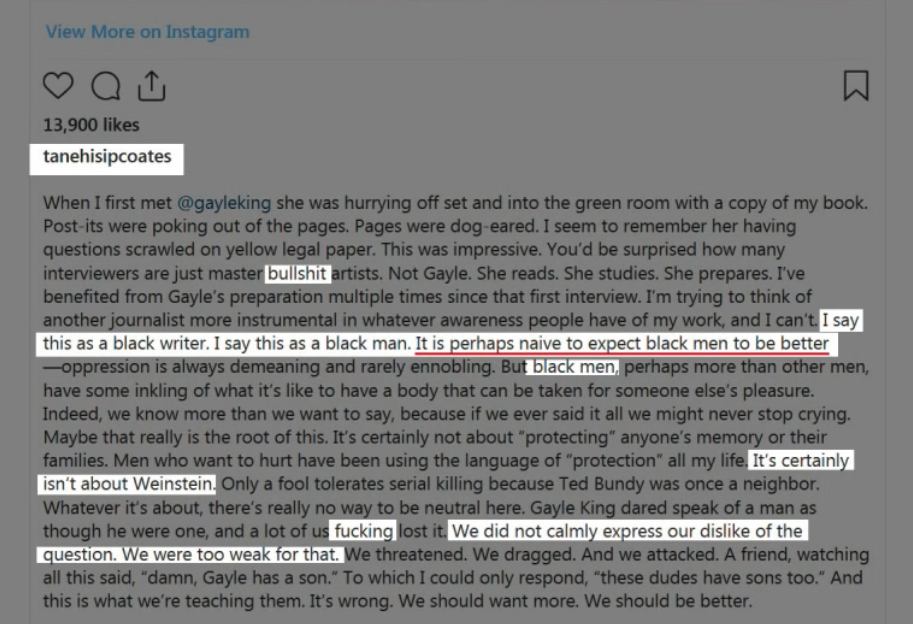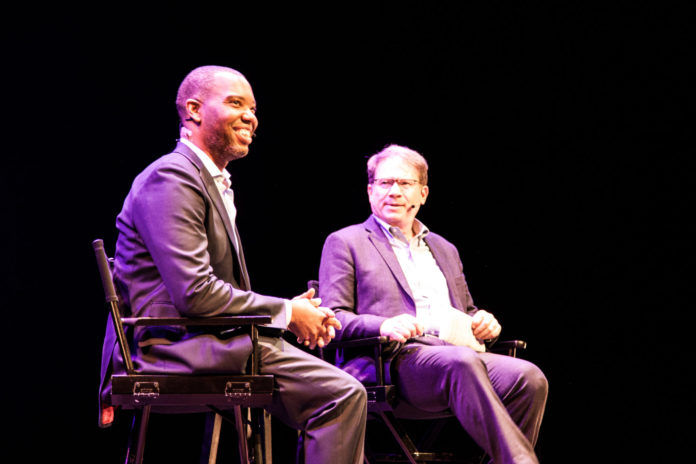The blinding spotlight from the Caucasian American Media Industrial Complex that, at present, shines on Ta-Nehisi Coates is so bright, he can see no one else around. He feels as if his hands, his feet, his chest are the only ones on stage. He is disillusioned and disoriented by the spotlight. And so Ta-Nehisi yells from the rooftops that he is a Black man, after all.

You have to wonder why someone would make a statement such as: “I say this as a black writer. I say this as a black man.” You have to wonder what he could mean. Does he mean that no one already knows that he is black? Can’t we all see, even if we are unaware? Of course, this much is obvious. Black is black is black. Why then must Ta-Nehisi emphasize his ever apparent blackness?
When a person announces his blackness in this way, on a social media platform no less, it cannot be left unscrutinized. Why does he think it is important to repeat this fact?
Ta-Nehisi appears to bestow upon himself the authority to speak for Black people, albeit a privilege which no individual Black person has the right to grant. He proceeds in this manner anyhow; Ta-Nehisi prefaces his statements under a white media spotlight as an authority on black men specifically, as underneath the white media spotlight he has no concern for his surroundings.
In those conference and meeting rooms, in those black tie affairs, Ta-Nehisi has grown accustomed to speaking around an audience of all white or part-white voyeurs as that black man in the room. When he makes a statement “as a black writer…as a black man” in a room full of white people, his word is final. He is the only voice on that subject. He has taken this careless behavior, as a self-appointed representative for a position that is de facto elected, to social media where he cares not one ounce what the Black people of which he speaks actually think, how they actually feel, or what they actually believe. He is in the white media spotlight, so to him, only his voice matters.
Unwittingly Ta-Nehisi positions himself beside the memories of the pseudoscientific anthropologists before him who have elected themselves to speak for millions of men who do not need nor want their fictions.
When Ta-Nehisi speaks in the plural “we”? Many Black people must rightfully ask: “But who is this ‘we,’ black man? ‘We’ do not agree. ‘We’ do not shine your spotlight. We have not elected you to speak on our behalf. The articulations of Black men need no further analysis, as they are already written in languages ‘we’ understand. Your experiences, your thoughts, your beliefs, your feelings, your motivations do not represent those of Black men. You are not the pulse of the people.”
When Ta-Nehisi says “as a black writer…as a black man,” I know that at this point he is not talking to Black people, but rather insidiously, he is talking about them, and loudly, and over their heads, and within their ear shot, but not to them. He could but does not want to talk to Snoop Dogg or any Black man for that matter, man to man, but he wants to talk around them, to provoke them. Ta-Nehisi aims not to engage them, but to humiliate, emasculate, and disrespect them. And for those actions, there is no recourse.
As a “black man” who cannot be bothered to speak directly to Black men, but only disparagingly about them, Ta-Nehisi wades into an icky, sticky, murky swamp above a perilous sinkhole. For every word that inks out of his pen, those coffers from the white media spotlight have made him comfortable, but certainly by no means wealthy, by purchasing his books, flocking to his talks, and funding his conspicuous vacations in Paris.
Ta-Nehisi has forgotten, or perhaps never cared, that no African American community has erected his pedestal. That the white media spotlight he enjoys, and which has shone brightest on his words and his voice, on his career and on his vacations, do not represent or speak to Black people. And here the dramatic irony is lost on the “black writer” who woefully misunderstands the dubious nature of the white media spotlight.
Ta-Nehisi must not forget that that same spotlight has blinded brighter men than he; it has bleached the backs of black men it now demeans in prison. And this white spotlight shines brighter still in this final act of malignant ruination. Why is Ta-Nehisi, the “black man,” so unsuspecting that this harsh white media spotlight is more blinding than its perceived, dubious act of illumination?










